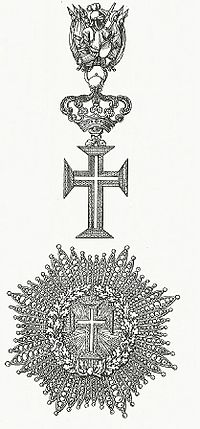Supreme Order of Christ
| Supreme Order of Christ Ordine Supremo del Cristo |
|
|---|---|

Star and badge of the Order of Christ
|
|
| Awarded by The Pope |
|
| Type | Single grade order of merit |
| Day | 14 March |
| Eligibility | Catholic heads of state |
| Awarded for | Services to the Church |
| Status | Dormant |
| Grand Master | Pope Francis |
| Grades | Knight |
| Statistics | |
| Established | 1319 |
| First induction | 1319 |
| Precedence | |
| Next (higher) | None (highest) |
| Next (lower) | Order of the Golden Spur |
|
Ribbon bars of the order |
|
The Supreme Order of Christ (Italian: Ordine Supremo del Cristo) is the highest order of chivalry awarded by the Pope. According to some scholars owes its origin to the same Order of Christ of the Knights Templar, from which came the Order of Christ that was awarded by the Kings of Portugal and the Emperors of Brazil. The Portuguese order had originally both a secular and religious component; by the 18th century, the religious component had died out.
The papacy insisted that the right of the Portuguese monarchs to award the honour had been granted by a pope in the Papal Bull Ad ea ex quibus issued in Avignon on 14/15 March 1319. While the Bull in itself does not explicitly grant to the Pope the right to issue the Order, successive popes since Pope John XXII have done so. For many years the Portuguese monarchy disputed the right of the papacy to award the Order, and in one famous case arrested someone for wearing the papal Order. The position of the Crown of Portugal was, that the only legitimate fons honorum was the Crown. The position of the Catholic Church is that the pope is the head of every religious order and may appoint, at his discretion without the permission of its Superior General, any individual he deems worthy.
As part of the general re-organisation of papal honours in 1905 by Pope Pius X, the papal Order of Christ was made the most senior papal honour. It was traditionally awarded to senior Catholic heads of state, notably Éamon de Valera as President of Ireland by Pope John XXIII. Controversially Popes Pius XII and John XXIII had refused to award the honour to his predecessor, Seán T. O'Kelly, to the fury of the Irish government. It was suggested to the Irish that usage of the Order was being phased out and that O'Kelly would be awarded a new level within the Pian Order of Pius IX, which from then on would be the Order given to heads of state. The Irish were however deeply unhappy at what they saw as a snub to their religious President O'Kelly. They suspected that the snub was revenge for his inadvertent causing of a diplomatic incident between Pope Pius XII and Joseph Stalin in 1950, when he revealed Pius's private belief that communism was likely to collapse and his views on Stalin, during a press conference after a papal audience. While a new level within the Pian Order was created and issued, the Order of Christ continued to be issued to other heads of state, including O'Kelly's own successor, de Valera.
...
Wikipedia
